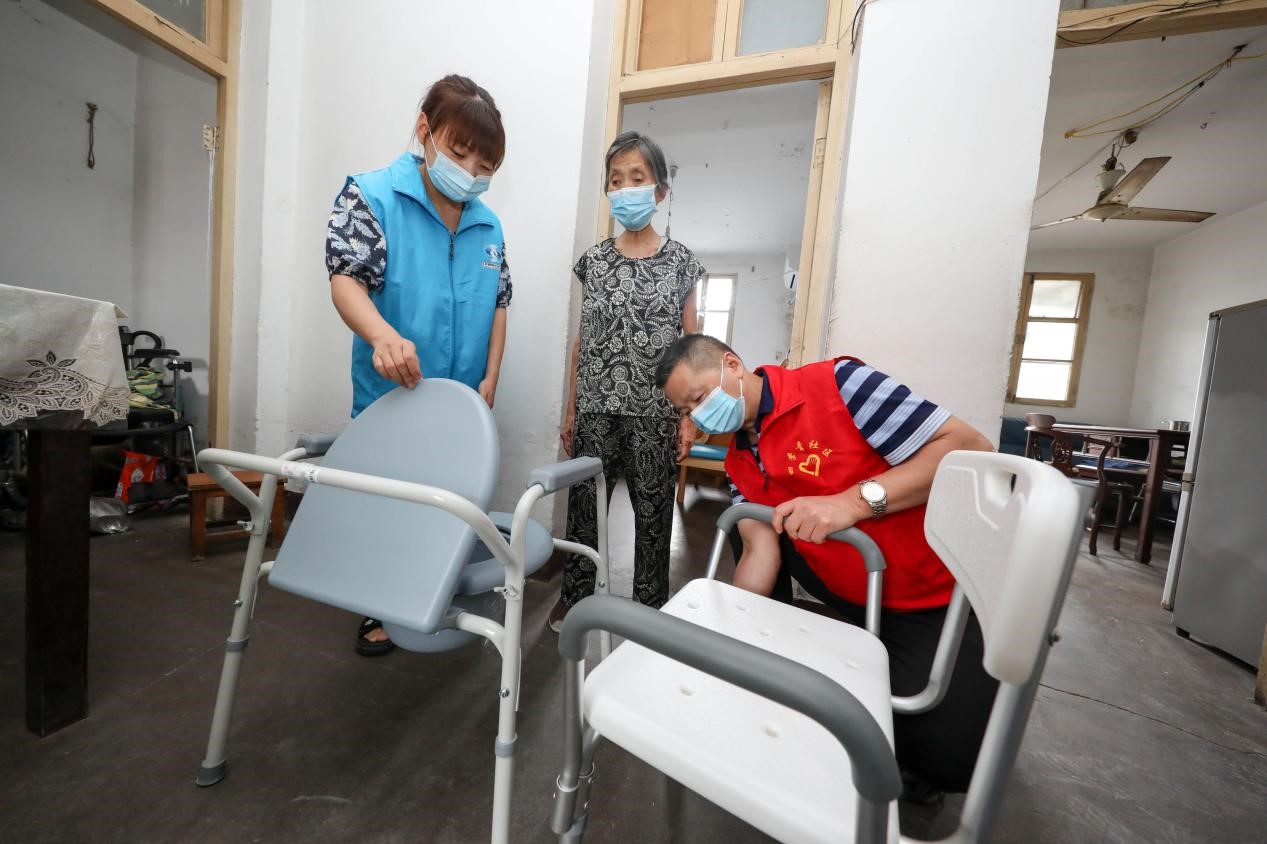Chinese cities actively adapt home environment for safety, comfort of the elderly
Chinese cities are trying to ensure a safe and convenient living environment for senior citizens by making their homes more senior-friendly.

Photo shows a sample room adapted for the use of the elderly at the exhibition hall of Beijing Anxin Pension Industry Investment Co., Ltd., a provider of elderly care services. (People’s Daily/Shen Shaotie)
According to the latest national population census, the number of Chinese people aged 65 or above has reached 190 million, accounting for 13.5 percent of the country’s total population.
Since most senior people in China prefer to spend their later years in their own homes, the city governments have been making active efforts to gradually renovate their homes, considering that they could be easily troubled by problems including falling down to the ground and other inconveniences in life.
“I press the remote switch, and the light comes on,” said a senior citizen surnamed Chen, demonstrating the transformed light in her bedroom to People’s Daily.
With the remote switch, the 72-year-old lady who lives in a residential community in Changxindian neighborhood, Fengtai district, Beijing, no longer worries about the inconvenience of turning on the light at night.
Chen, who suffers from heart disease and rheumatism and couldn’t walk fast, has benefitted a lot from many such transformations to her home since September 2019.
Besides the intelligent light, a table was installed beside her bed, which can not only help her get up from bed, but ensure her easier access to daily necessities.

Community workers give senior-friendly products, including sitting chair and shower chair, to an elderly resident in Sijiqing community, Huai’an city, east China’s Jiangsu province, as gifts, Sept. 2, 2021. (People’s Daily Online/Wang Hao)
Her bathroom is equipped with a bath chair and a bath mat, while toilet has two arms to help her get up. Besides, Chen also added a folding wheelchair and a walking aid to her home.
“My life is much more convenient after the remodeling. I can now go to the bathroom and take a shower more safely,” Chen said, adding that the transformation cost, totaling more than 4,400 yuan ($684.2), was fully covered by the government.
Chen is one of the beneficiaries of Beijing’s policies on creating a friendly home environment for the elderly. In September 2016, the city launched a house remodeling project to improve the living conditions of its senior citizens with financial difficulties.
The project covers such aspects as assistance in walking, bath, home cleaning, emergency rescue, and rehabilitation. The house remodeling costs of each household are kept within 5,000 yuan.
Because of the project, many senior citizens have enjoyed gratifying changes in their homes during the past five years.
This year, another over 2,000 households will see more senior-friendly home environment with the help of the government, said an executive from Beijing Municipal Civil Affairs Bureau.
Similar projects have been carried out in other cities across the country. In July this year, east China’s Shanghai launched a home remodeling project comprehensively, which applies to all citizens aged 60 or above. Qualified senior citizens who are impoverished or childless or live alone can receive subsidies from the public welfare lottery fund for remodeling.
Shangcheng district of Hangzhou, capital of east China’s Zhejiang province, plans to pilot a project to adapt the homes of 218 poor senior people’s families this year, and provide a subsidy of 6,000 yuan for each household.
“Preventing the elderly from falling down should be the first priority of adapting home environment for them,” said E Junyu, president of the senior-friendly industry branch of China Building Materials Market Association and chairman of Beijing Anxin Pension Industry Investment Co., Ltd., an elderly care service provider.
Interior design and construction of residential buildings in China didn’t really take into consideration the needs of elderly, so senior citizens have faced inconveniences and safety hazards in their homes, E said, pointing out that an accidental fall could easily cause senior citizens to be bedridden for a long term, which often involves high medical and care costs.
In addition to projects carried out by governments, market-based services have been launched by quite a lot of companies to adapt homes of the elderly. These companies can tailor transformation plans for their customers.
“More and more senior citizens and their families are looking for help to make their homes more senior-friendly,” said E, explaining that his company often sends counselors to homes of the elderly to get information about their health condition and home environment, make remodeling plans after discussion with customers, and then carry out the remodeling tasks.
Home remodeling for the convenience of the elderly is still in the initial stage in China, experts pointed out, adding that many Chinese people lack knowledge about the dangers of falls for the elderly and are unfamiliar with the idea of senior-friendly remodeling.
Consumption and services related to senior citizens’ needs enjoy huge opportunities and vast prospects, they said, suggesting that governments and relevant enterprises cooperate with property management companies and other parties to, through means such as ads and lectures, help more senior citizens and their families realize the necessity of adapting homes for the safety and comfort of seniors.
Photos
Related Stories
- China develops community-based home care services for elderly
- Town in Shanghai builds mutual-assistance elderly care facilities to improve the lives of senior residents
- China's elderly become major consumers of beauty salon services
- China's elderly embrace big tech, senior-friendly products
- 70-year-old woman graduates from China’s top art university
Copyright © 2021 People's Daily Online. All Rights Reserved.










